Intel Haswell Low Power CPU Review: Core i3-4130T, i5-4570S and i7-4790S Tested
by Ian Cutress on December 11, 2014 10:00 AM ESTCPU Benchmarks
The dynamics of CPU Turbo modes, both Intel and AMD, can cause concern during environments with a variable threaded workload. There is also an added issue of the motherboard remaining consistent, depending on how the motherboard manufacturer wants to add in their own boosting technologies over the ones that Intel would prefer they used. In order to remain consistent, we implement an OS-level unique high performance mode on all the CPUs we test which should override any motherboard manufacturer performance mode.
FastStone Image Viewer 4.9
FastStone is the program I use to perform quick or bulk actions on images, such as resizing, adjusting for color and cropping. In our test we take a series of 170 images in various sizes and formats and convert them all into 640x480 .gif files, maintaining the aspect ratio. FastStone does not use multithreading for this test, and results are given in seconds.
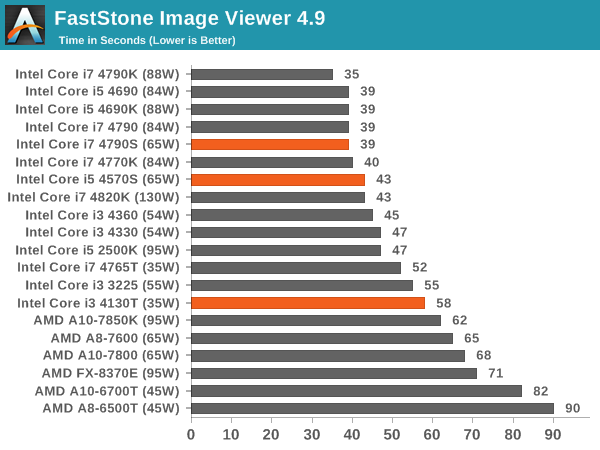
In single threaded mode these CPUs are designed to act like their non-S counterparts, except for the T which takes a bigger adjustment in the FastStone benchmark.
Dolphin Benchmark: link
Many emulators are often bound by single thread CPU performance, and general reports tended to suggest that Haswell provided a significant boost to emulator performance. This benchmark runs a Wii program that raytraces a complex 3D scene inside the Dolphin Wii emulator. Performance on this benchmark is a good proxy of the speed of Dolphin CPU emulation, which is an intensive single core task using most aspects of a CPU. Results are given in minutes, where the Wii itself scores 17.53 minutes.
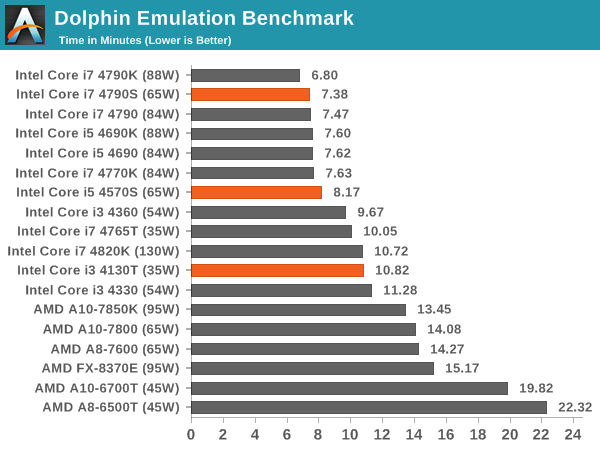
Dolphin is also single threaded, where the i7-S CPU performs on par with its non-S counterparts. The i3-T is more along the other i3 CPU we have tested.
HandBrake v0.9.9: link
For HandBrake, we take two videos (a 2h20 640x266 DVD rip and a 10min double UHD 3840x4320 animation short) and convert them to x264 format in an MP4 container. Results are given in terms of the frames per second processed, and HandBrake uses as many threads as possible.
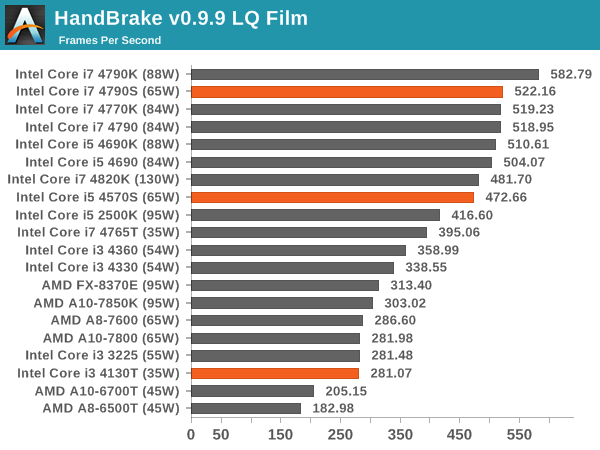
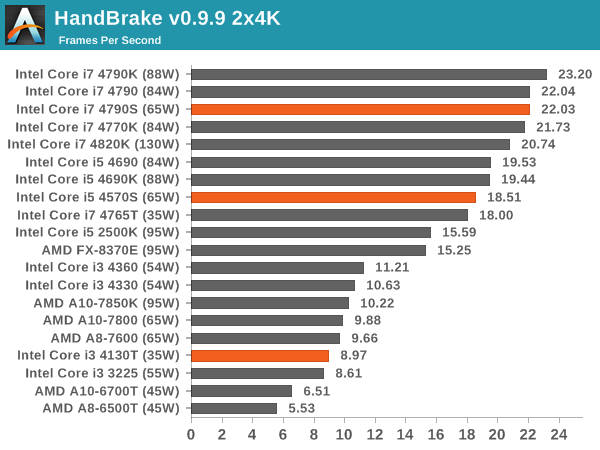
WinRAR 5.0.1: link
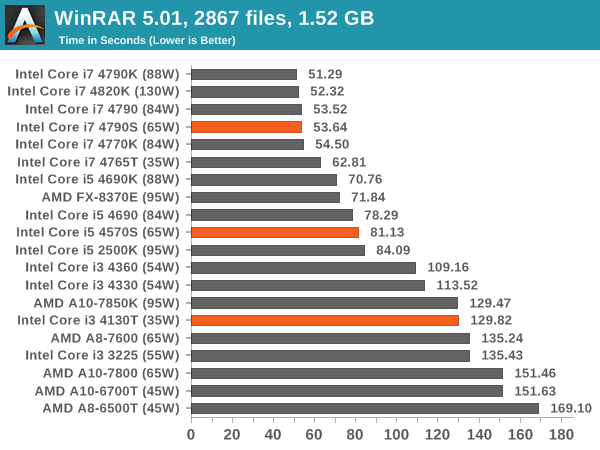
WinRAR exposes some of the variable multithreaded results, here showing the i3-T is a bit down on the non-T, but the S models are on par again.
3D Particle Movement
3DPM is a self-penned benchmark, taking basic 3D movement algorithms used in Brownian Motion simulations and testing them for speed. High floating point performance, MHz and IPC wins in the single thread version, whereas the multithread version has to handle the threads and loves more cores.
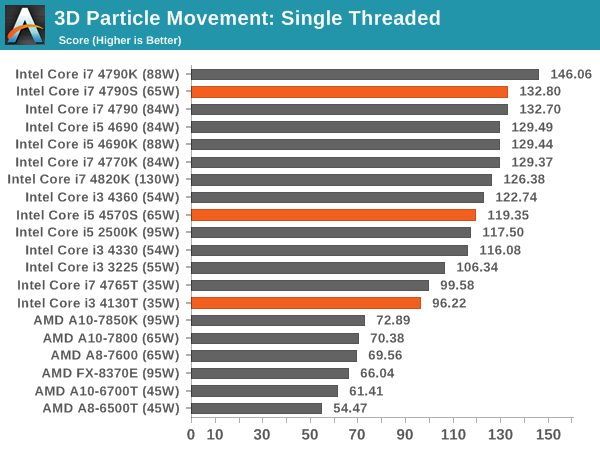
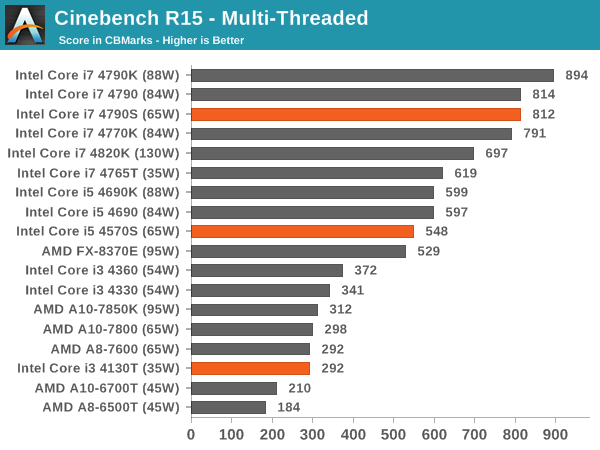
Surprisingly our i7-S CPU seems too perform as well as the non-S CPU.
Web Benchmarks
On the lower end processors, general usability is a big factor of experience, especially as we move into the HTML5 era of web browsing. For our web benchmarks, we take four well known tests with Chrome 35 as a consistent browser.
Sunspider 1.0.2
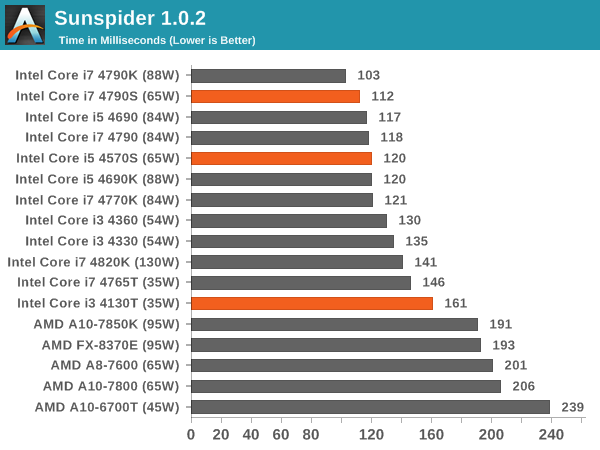
Mozilla Kraken 1.1
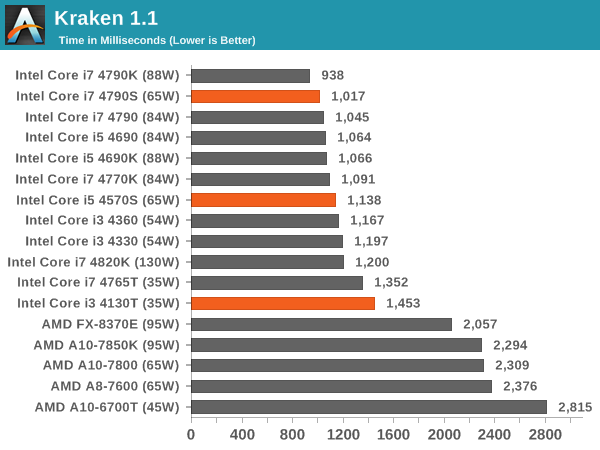
WebXPRT
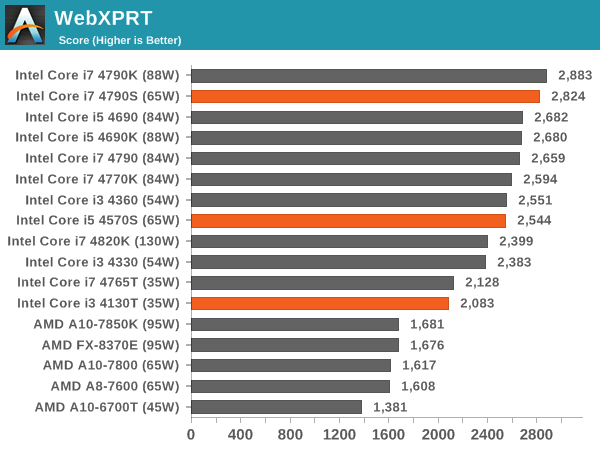
Google Octane v2
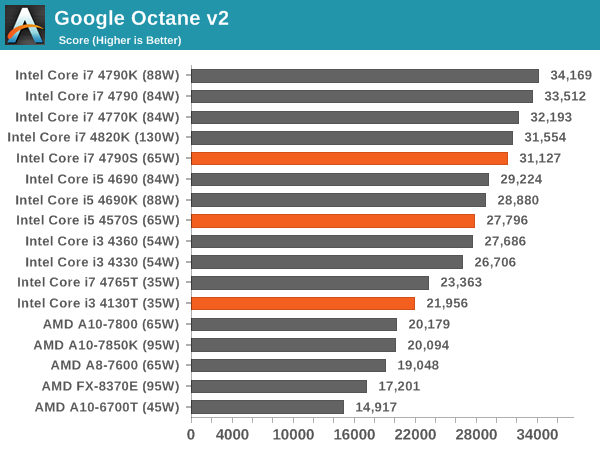










76 Comments
View All Comments
nathanddrews - Thursday, December 11, 2014 - link
Hmph.Khenglish - Thursday, December 11, 2014 - link
So you think these CPUs really are better binned? An undervolted K series cannot always pull off the voltages at the same clocks as a S series?If so do you think these better binned chips finally at least match Ivy Bridge in terms of performance per watt?
casteve - Thursday, December 11, 2014 - link
No, they aren't better binned. Another site looked at the voltage vs. freq curve and found that the std TDP, S, and T parts all followed the same curve. That i7 S part looks like an oddball.Samus - Thursday, December 11, 2014 - link
I work with HP Elitedesk 800's all the time with I5-4570S CPU's. They're incredibly small and quiet, much more so than the identically sized USFF dc7900 Core 2 Duo's they replaced.name99 - Thursday, December 11, 2014 - link
We constantly hear about how aggressively Intel bins parts, how each model is a special snowflake that's exactly optimized for its role, etc etc. I've yet to see any evidence that this is actually true (as opposed to "Intel engages in very aggressive market segmentation --- by product name".The primary reason I'm not convinced is that no-one else bins nearly as aggressively. Apple, never a company to miss the opportunity for a dollar, doesn't engage in some obvious binning (eg ship the iPhone6+ at 100MHz faster; or even give you a 100MHz speed boost in each model as you go from 16GB to 32GB to 64GB storage). Qualcomm offers a fairly limited palette of Snapdragon speeds. Samsung, the master if there ever was one, at slicing and dicing phone models, doesn't offer the same phone at speeds of 1, 1.5, and 2GHz; etc etc.
We have to assume that
- everyone else's processes are crazy uniform compared to Intel OR
- Intel is MUCH smarter than anyone in how they are able to bin OR
- binning (at the micro segmentation Intel offers) just is not a real thing
and the third option seems the most plausible to me.
Samus - Thursday, December 11, 2014 - link
Almost nobody pays attention to GHz numbers in mobile devices. Nobody really cares. And the scaling with ARM really means nothing. Apple consistently has among the highest performance ARM CPU's yet they're lower clocked and lower core count than everyone else. Binning ARM CPU's would require two things in order to be profitable: real-world benefits to a slightly higher clock speed, and marketing the higher clock speed as worth the premium. Currently there are neither. I'd guess 99/100 people don't even know the clock speed of the phone they own, because that's how irrelevant it is. For many applications (such as gaming, where performance is not consistent across the majority of devices) the GPU matters more than the CPU because of how heavily optimized these apps are for the GPU.The PC landscape is totally different.. You still have PC's sold that have 1/10th the performance of a Core i7.
Now, where your idea could be interesting is if they sell an "eco" chip that runs at a lower voltage due to binning. People MIGHT be willing to pay extra for a phone with +20% battery life.
Kjella - Friday, December 12, 2014 - link
Or perhaps the simplest and most obvious explanation - Apple feels they're more in the console game than the PC game. Offer one consistent level of performance across all iPhones of the same generation and that's the spec all developers need to relate to.Hrel - Friday, December 12, 2014 - link
- everyone else's processes are crazy uniform compared to Intel OR- Intel is MUCH smarter than anyone in how they are able to bin OR
Those are both true.
wumpus - Friday, December 12, 2014 - link
So Intel chips can't be overclocked and produce more watts than different lettered processors under identical conditions? That isn't what was tested and would be a rather shocking development.Chips take a considerable time to fab. Markets change fast and somehow Intel manages to produce what the market needs in the face on negligible competition? Yea, I really believe that they are really binning and not simply segementing to what marketing wants.
BSMonitor - Friday, December 12, 2014 - link
Use case. A PC's use case is an entirely different world than mobile phones. Your anti-Apple bias aside, what applications would users engage in on their smart phone where CPU performance could be noticeably segregated by clock speed. In this space. The only indication of CPU performance is the "snapiness" of the response from whatever app you are in.In a PC sense, I could launch an application or task that takes minutes, hours, etc.. 200-300 MHz would be noticeable over the course of an hour of video compression.
Apples and oranges.